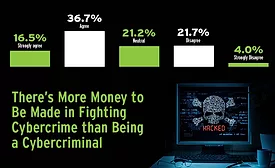Home » cyber security careers
Articles Tagged with ''cyber security careers''
Hiring and Training Challenges for CISOs in 2018
Eliminate the Skills Gap by Addressing 3 Major Challenges
April 4, 2018
Sign-up to receive top management & result-driven techniques in the industry.
Join over 20,000+ industry leaders who receive our premium content.
SIGN UP TODAY!Copyright ©2026. All Rights Reserved BNP Media.
Design, CMS, Hosting & Web Development :: ePublishing









